- Home
- Upton Sinclair
The Return of Lanny Budd Page 2
The Return of Lanny Budd Read online
Page 2
‘That would, of course, be perfectly agreeable to us; but you really must let us take care of your expenses going and coming. As to Meissner, what are his financial circumstances?’
‘He would be poor, I imagine. He has a large family. He was crippled by a war wound and can no longer play the piano. I suppose he can compose, but who could pay him for it now in Germany? His last composition that I know of was a Hitler march modelled on Wagner’s “Kaisermarsch.”’
‘You would be at liberty to offer him money within reason. It might be that he would enter our service—of course after you have made sure he could be trusted. It might occur to him that since you had deceived him for a number of years he would be justified in deceiving you for an equal number’.
‘All Nazis believe in deceiving people. The only question would be whether they would rather deceive Communists or Americans. I would have to find out about that before I made any offer of money. But explain this to me. Mr Turner: Stubendorf is now in Poland, and my understanding is that the Poles have an independent government, or supposed to be independent. Aren’t they the ones to handle this?’
‘We are doing our best to think of Poland as a friendly government, Mr Budd. We understand that the Soviets are still exercising military authority there, and we wish to think of them also as friends. We have reported the matter a number of times, and we expected the co-operation that one gets from civilised governments; but we have met only with evasions and delays. The matter has been hanging fire for a year now, and meantime this queer money, as we call it, continues to be smuggled into Berlin and into Western Germany and to be put into circulation there. We have to face the possibility that the local authorities, whether Polish or Soviet, may be in league with the criminals, and perhaps sharing the profits. If so, that is indeed a serious breach of good faith and of international fair dealing. We have decided that we must get some information for ourselves, and it occurred to us that you, being known as an art expert and an advocate of peace, might be able to get permission to visit Stubendorf—whether to look for some paintings to purchase, or perhaps to meet your old friend, Kurt Meissner, whatever seemed best in your judgment’.
‘It would not be easy for me to go. My wife is pregnant, and her time is due in a couple of months. A husband likes to be around at that time; also, we have a considerable business on our hands. It would be a question of making plans ahead and giving instructions to our staff’.
‘I don’t think this would be a long assignment, Mr Budd, and it is a matter of really top importance. We have reason to think that some of the priceless plates may be hidden in Stubendorf; or at any rate that persons in Stubendorf know about them. Would you think it a possibility that Meissner himself might be concerned in that?’
‘You have named three sorts of persons who might be involved, Mr Turner—Nazis, gangsters and Communists. Which do you suspect in this case?’
‘It is hard to be sure, Mr Budd, because the three groups shade into one another. Some of the Nazis have turned into gangsters and many have entered the service of the Communists—some of the highest and the most capable have done so. Gangsters, of course, pose as Communists, or as Nazis, whichever suits their purpose at the moment. Would it not be possible for you to approach Meissner on the basis of your old friendship? It hurts you to think of his hating you, and you are anxious to heal the old wound.’
‘I could do that, of course. But he will be certain to suspect that I have some hidden motive’.
Said Turner, ‘Approach him carefully, discuss the situation of Germany with him, and make sure of his point of view. Then, even if you cannot fool him, at least you can be sure he is not fooling you’.
V
Lanny spent the next couple of hours learning the ABCs of the counterfeiting industry, hitherto unfamiliar to him. He made notes and promised to memorise them and then destroy them. He was shown specimens of British five-pound notes printed on white paper and of American five-dollar notes, known by such affectionate titles as ‘the long green’ and ‘folding money’. He could see nothing wrong with them and would have taken them gladly. Then Turner took him to a microscope near the window and told him what minute errors to look for; even then it was not easy to find them.
Men had died for the commission of those small mistakes. Turner told him how a group of three or four of these engraver-slaves had conspired to hide minute marks in the plates, whereby the notes could subsequently be identified. This was discovered, and the conspirators were sent to the gas chamber—that is, they were poisoned by cyanogen, their bodies burned in the furnace, and their bones ground up for fertiliser. All the engraver-slaves at Sachsenhausen had worked with this menace hanging over them; if they made a mistake it would be taken for granted that they had done it on purpose; mistakes were simply not permitted.
Turner did not go into the details of the case that Lanny was to investigate. All that would be supplied by the Treasury agents he would meet in Berlin—the Secret Service being a branch of the Treasury. Turner said, ‘Something might happen so that you couldn’t go;’ and Lanny understood this without explanation. Agents were told only what they needed to know and only when they needed to know it. Their dealings with the rest of the world were upon that same basis.
Lanny agreed to fly three days from date and was told that his passport and tickets would be brought to his home. He was taken into a photographing room and his face was ‘shot’; a pleasant face it was, usually, but somehow people always look solemn for this special occasion. The developing took only a few minutes, and the new agent received a leather folder with his accrediting as an agent of the United States Secret Service.
The official said, ‘Credentials can be lost or stolen, so you must have a password which you can speak to the proper man when you meet him. You may choose a word’.
Lanny hadn’t the remotest idea why the name Christopher Columbus popped into his head, but he said it, and the other smiled and said, ‘Okay’. During the war years Lanny had often wondered how such names as ‘Operation Overlord’, ‘Anvil’, and ‘Torch’ had come to be chosen. Now he could guess.
VI
Lanny left the Treasury Building and went walking along Pennsylvania Avenue, swarming with traffic. He had his notes in hand and was diligently learning them. Suddenly another idea popped into his mind; he went to the first telephone kiosk he could find and called the White House. He asked for the President’s first secretary, knowing that he wouldn’t get that busy and important individual but one of the assistants. He explained that some three months previously he had been flown to Moscow as a personal representative of President Truman, to interview Marshal Stalin on the President’s behalf. Maybe the assistant had not heard of this, but the first secretary had undoubtedly heard of it. Mr Budd was going back to Europe, leaving in three days, and the President had suggested that if he ever was planning such a trip he, the President, should be informed.
The assistant, properly impressed, promised to bring the matter to the first secretary’s attention. The impressive Mr Budd said that he was staying at the Shoreham Hotel for this night only and was intending to motor to his home in New Jersey early in the morning, unless he heard that the President desired to see him before he left.
Having thus spoken, Lanny went walking again, and when he came to the hotel he found his wife lying on the bed, working on a portfolio of manuscripts she had brought along. He said to her, ‘Darling, I have promised to fly to Berlin to give somebody some advice. There is nothing dangerous about it, and I want you please not to worry. I expect to stay only a few days’.
He said no more, and Laurel asked no more, being a well-trained wife. Worry she would have, knowing that he would be flying over the same route in which he had had both his legs broken in a dreadful accident. It amused him to point out to her that only because of those broken bones had she got a chance to lure him into matrimony. You can say things like that in matrimony, provided that you smile while you say them. Lanny smiled frequently
at this alert little woman who had taken charge of his affairs; she was a most conscientious person, with a sharp tongue, but she used it as a rule only on the warmakers.
Hardly had he taken a seat and unfolded the afternoon paper before the telephone rang. There was the assistant secretary, saying that the President requested Mr Budd to be at the White House at nine that evening. Lanny said, ‘I will be there’.
It was hard not to tell Laurel that item of news, but he would have to wait until he had made sure whether this also would be a confidential mission. He had promised to take her to a movie that evening, but instead he had to tell her, ‘This is part of the job’. All she answered was, ‘It will give me a chance to do my homework’.
VII
It is not considered good form to approach the White House except in a vehicle; but Lanny felt like walking on this crisp fall evening. When he came to the gates the naval sentry on duty accepted his statement that he had an appointment with the President; but a man in civilian clothes stepped out from behind the sentry box and followed close behind him. Two other such men stepped forward at the portico, and it amused Lanny greatly to produce the card in a little folder that Turner had given him that afternoon. The three men looked surprised and promised they would know him next time.
Inside an elderly Negro took his hat, and the secretary led him to the elevator. This stately and dignified building was less than a hundred and fifty years old, but it was rapidly giving way to decay. The floor of the President’s bathroom was so creaky that he was afraid he was going to fall into the room below. Before long they would have to spend five and a half million dollars to take the building to pieces and put it together more soundly. But none of that showed, and there was nothing to mar the visitor’s impressions of these historic rooms.
In the old days Lanny had been taken to the third floor to Franklin Roosevelt’s bedroom and had found the Boss in bed, wearing an old crew-neck sweater upon which moths had got in their evil work. Now on the second floor he found Harry Truman sitting at a large desk, looking like one of the ten best-dressed Americans, with a stack of papers before him. He had to sign his name six hundred times every day of his life, and sometimes he got up at half-past five in the morning to finish the previous day’s stint.
He was a man of medium size, a couple of inches shorter than Lanny. He was quick in his movements and impulsive in his speech. He got up when he saw the visitor, shook hands cordially, and told him how glad he was to see him again. He signed him to a seat and said, ‘Mr Budd, I listen to your programmes whenever I can get a half-hour. I envy you the judgment and taste you show. You have been bringing forward the best minds in our country, and I only wish I could spend my time with such people’.
‘The judgment and taste are mostly my wife’s’, replied the visitor. ‘She is the boss of that programme’.
‘You must bring her to see me some time. Tell her I envy her the ability to work for peace and to believe in it’.
‘She will ask me if you do not believe in it, Mr President’, said Lanny, smiling.
But the President did not smile. ‘I am truly a man of peace, Mr Budd. I would give my life to be able to prevent another world war. But reports come to me, and I am forced to face the fact that there are people who don’t share my feelings. You know the old saying, “It takes two to make a quarrel”; but that is just not true. A drunken man can make a quarrel, a bully can make it, a fanatic can make it. I think it would be more correct to say that it takes two to keep the peace’.
‘A wise and careful statement’, said Lanny. ‘I will tell you frankly, I am coming to share your uneasiness’.
‘I understand that you are going abroad, Mr Budd. How long do you plan to stay?’
‘I can’t be sure about that. It depends upon what I find. I am going on a government errand’. He would not tell even the President unless the President specifically asked—and the President didn’t. What he said was, ‘I wish you would make it an errand for me also. I know that you have sources of information and I wish you would keep your eyes and ears open and tell me what you think I can do to persuade the Politburo to keep its agreements’.
‘I will be glad to do what I can, Mr Truman’.
‘I know what you did for President Roosevelt, and truly I need your help’.
VIII
This accidental President of the U.S.A. was a sociable man, and he was often lonely in that great mansion where he couldn’t enjoy the company of any man without making a score of others jealous. Just now he was in a mood to pour out his heart, and this visitor was a man whom the newspaper reporters hadn’t yet found out about.
Said the President, ‘I need not tell you, Mr Budd, that I was not trained for this job. I was surprised that I was invited to become a senator; I was still more surprised when I was made a candidate for vice-president, and when this terrific load was dumped on me I was really in a panic. I knew little about international affairs—I had spent my time as senator trying to keep big business people from cheating the government. But now, it seems, I have the whole world on my shoulders—and so much of it going wrong!
Franklin Roosevelt led me to believe and hope that when we had given the Soviet government eleven billion dollars of lend-lease aid and the help of all our Armed Forces to put Hitler out of his evil business—that then we would have Russia for a friend and an ally; we would be able to work out a friendly solution of all our problems. I felt sure we had no real reason for rivalry or quarrel with that country. I thought that Roosevelt had given every evidence of friendship in the Yalta Agreements, and that I had done the same at Potsdam. But now look! They wouldn’t get out of Northern Iran until they had a government there that suited them. They are in Dairen and Port Arthur and are under pledge to evacuate them, but they don’t. They are supposed to agree to the setting up of democratic governments in Poland, Hungary, and those other countries, and apparently they just mean to take them over. They are threatening some provinces of Turkey and trying to set up a revolution in Greece. And when I go before Congress and urge military aid to those threatened countries I am blasted before the whole world as a warmonger. Tell me, what am I to make of that? What am I to do?’
Lanny said, ‘The way to answer that, Mr Truman, is to tell you my experience with Adolf Hitler. It was just about a quarter of a century ago that I heard him make a speech in a Munich beer-hall. Before long I met him, and then I watched his career year after year until he seized power and began to threaten the rest of the world. When I travelled in France and England people would ask me in dismay the same question that you have asked: What are we to make of him? My answer was always one thing, “Read his book”. He had told the whole story in Mein Kampf. He portrayed himself, his life, his ideas, his purposes, in detail; yet I doubt if one person out of ten to whom I gave the advice ever took the trouble to look into Mein Kampf—it was hard reading, I admit. But here is the same situation with Stalin. He is a voluminous writer, and any one of his books would do. Unlike you, Mr Truman, he was trained for his job; he spent his whole life training for it—in prison, in hiding, or wherever he was. He has a perfectly definite and precise programme, and he tells you all about it. Of course he is writing for his own kind of people, and he assumes that no other kind will take the trouble to read him—and they don’t’.
‘Speaking confidentially, Mr Budd’, replied the President, ‘I asked for the opinion of our embassy on this subject, and our charge in Moscow, George Kennan, has read the books. He sent me an elaborate cablegram in which he agreed pretty much with you. But he ended up with the advice that “face” is all important to Moscow, as it is to the Chinese; so if we expect to get any agreement with them it is essential to put the proposition in such a way as not to humiliate them’.
‘That’s all very well, Mr President, provided they want an agreement; but suppose they don’t want an agreement? Suppose they want what they want?’
‘That is the question that keeps me awake at night, Mr Budd. But I am surpris
ed to hear it from you, the conductor of a peace programme’.
‘Ah, me, Mr Truman!’ said the conductor. ‘That keeps me awake at night also. You must understand: an old friend of my mother died and left her fortune to be used for this purpose. The war was just over, and we had won it and were in a fine glow of enthusiasm. Everything was going to be different now; the boys were being brought home on points and the world was going to be made over, with your help. We believed Stalin, because we had to believe him; it was too terrible not to. All sorts of people took fire, and it was wonderful—the beginning of a new world. The United Nations was going to be run on a basis of world friendship. But now come these developments, one after another, and we discover that the United Nations is to be nothing but a platform from which Stalin can pour out his propaganda of hate’.
‘What will you do—change the programme?’
‘It is a foundation, and we have the problem of keeping faith with the dead. Emily Chattersworth was my friend from my cradle up, and I know that she was no Communist and would have no idea of turning the world over to violent revolutionists. I haven’t broached the idea to my associates, but I have the thought to turn the programme and the paper into an open forum and let the questions be argued out. The problem is more difficult because my wife is with child, and I shrink from putting any strain upon her in the next couple of months’.
‘I can understand your position’, said the President. ‘My own wife has no love for politics and would like nothing better than to go back to Independence, Missouri, where she could have some friends without concerning herself with social precedence, and without having to be worried about people trying to make use of her’.

 Prince Hagen
Prince Hagen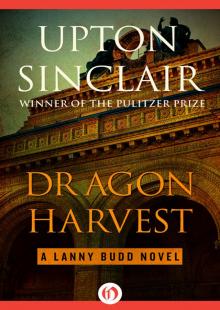 Dragon Harvest
Dragon Harvest The Jungle
The Jungle Sylvia's Marriage
Sylvia's Marriage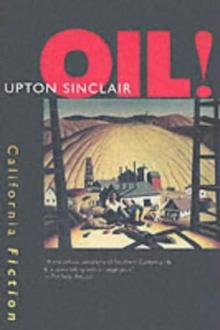 Oil! A Novel by Upton Sinclair
Oil! A Novel by Upton Sinclair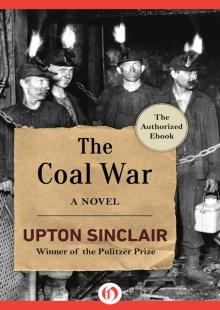 The Coal War: A Novel
The Coal War: A Novel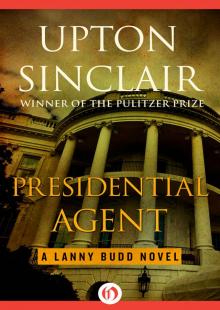 Presidential Agent
Presidential Agent World's End
World's End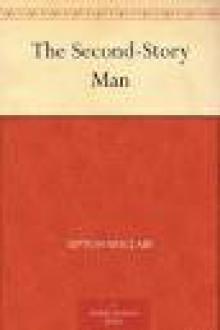 The Second-Story Man
The Second-Story Man O Shepherd, Speak!
O Shepherd, Speak!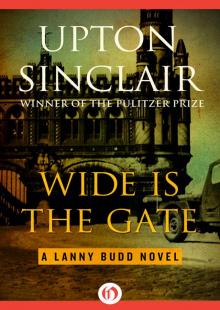 Wide Is the Gate
Wide Is the Gate The Return of Lanny Budd
The Return of Lanny Budd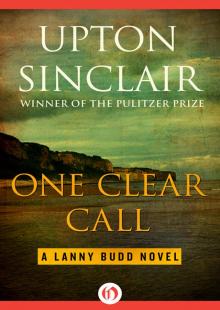 One Clear Call I
One Clear Call I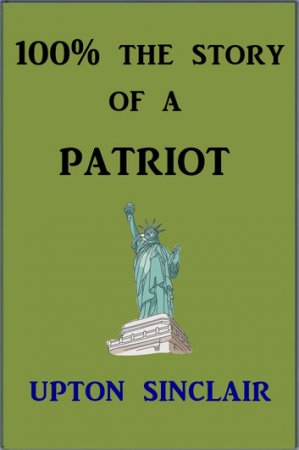 100%: the Story of a Patriot
100%: the Story of a Patriot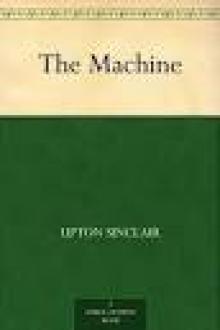 The Machine
The Machine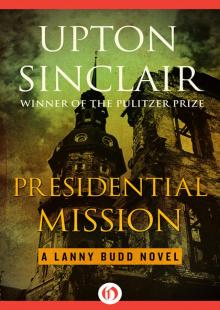 Presidential Mission
Presidential Mission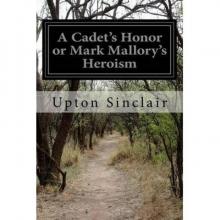 A Cadet's Honor: Mark Mallory's Heroism
A Cadet's Honor: Mark Mallory's Heroism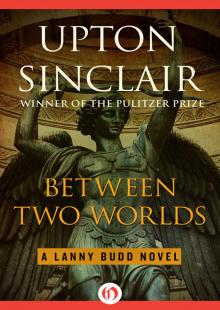 Between Two Worlds
Between Two Worlds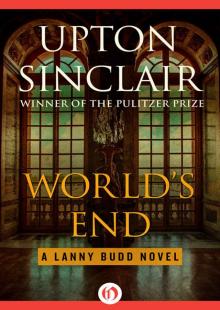 World's End (The Lanny Budd Novels)
World's End (The Lanny Budd Novels)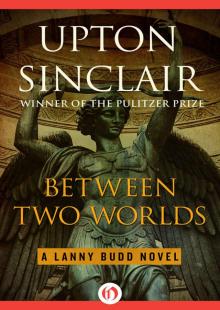 Between Two Worlds (The Lanny Budd Novels)
Between Two Worlds (The Lanny Budd Novels)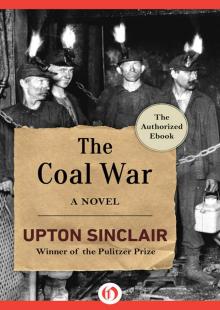 The Coal War
The Coal War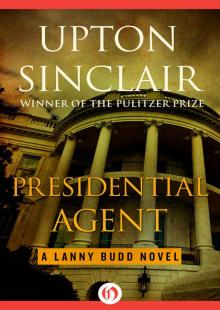 Presidential Agent (The Lanny Budd Novels)
Presidential Agent (The Lanny Budd Novels)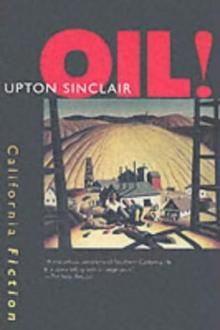 Oil (filmed as There Will Be Blood)
Oil (filmed as There Will Be Blood)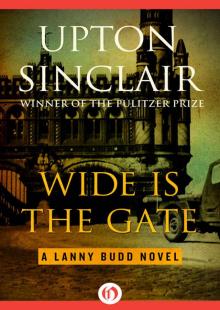 Wide Is the Gate (The Lanny Budd Novels)
Wide Is the Gate (The Lanny Budd Novels)